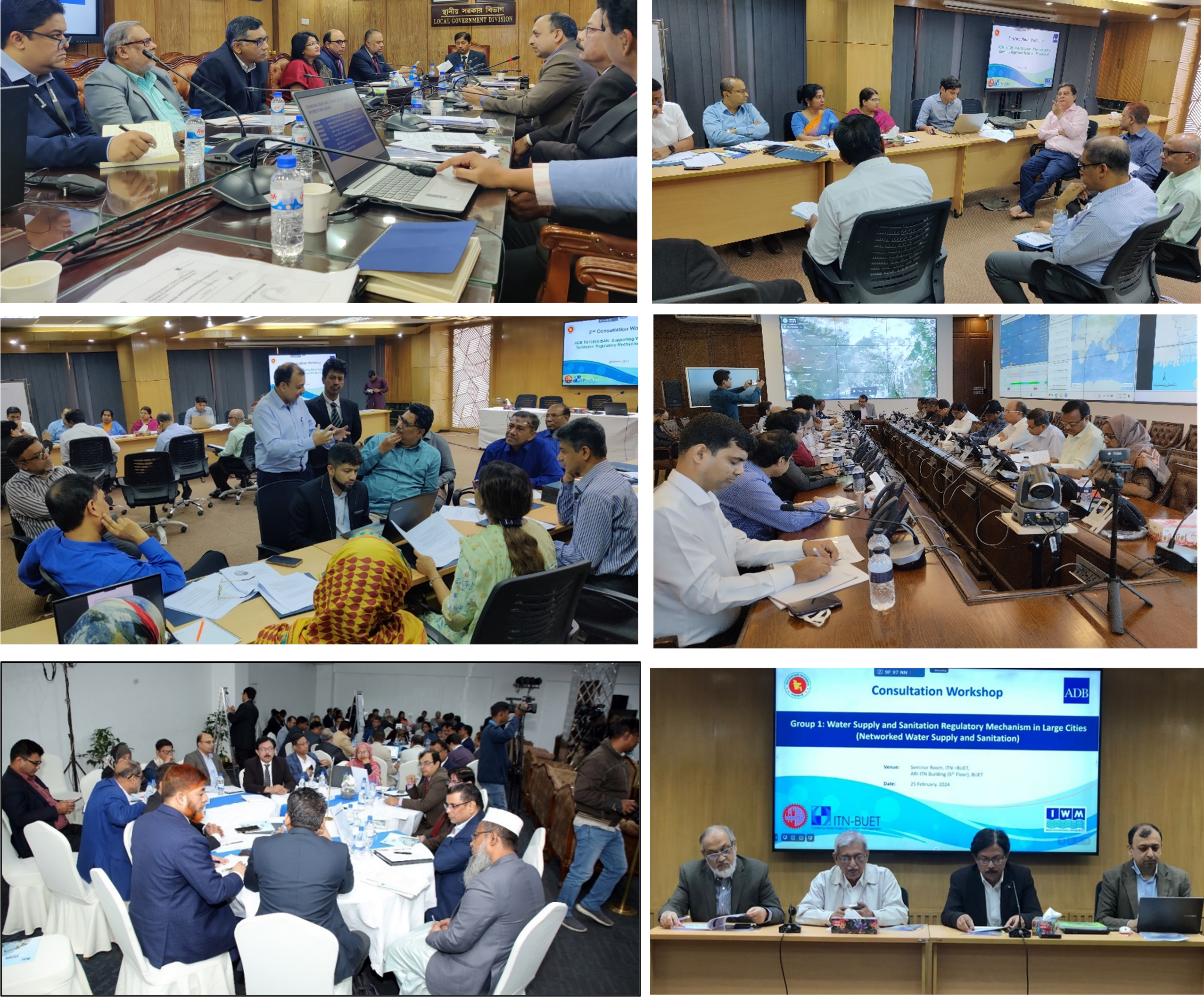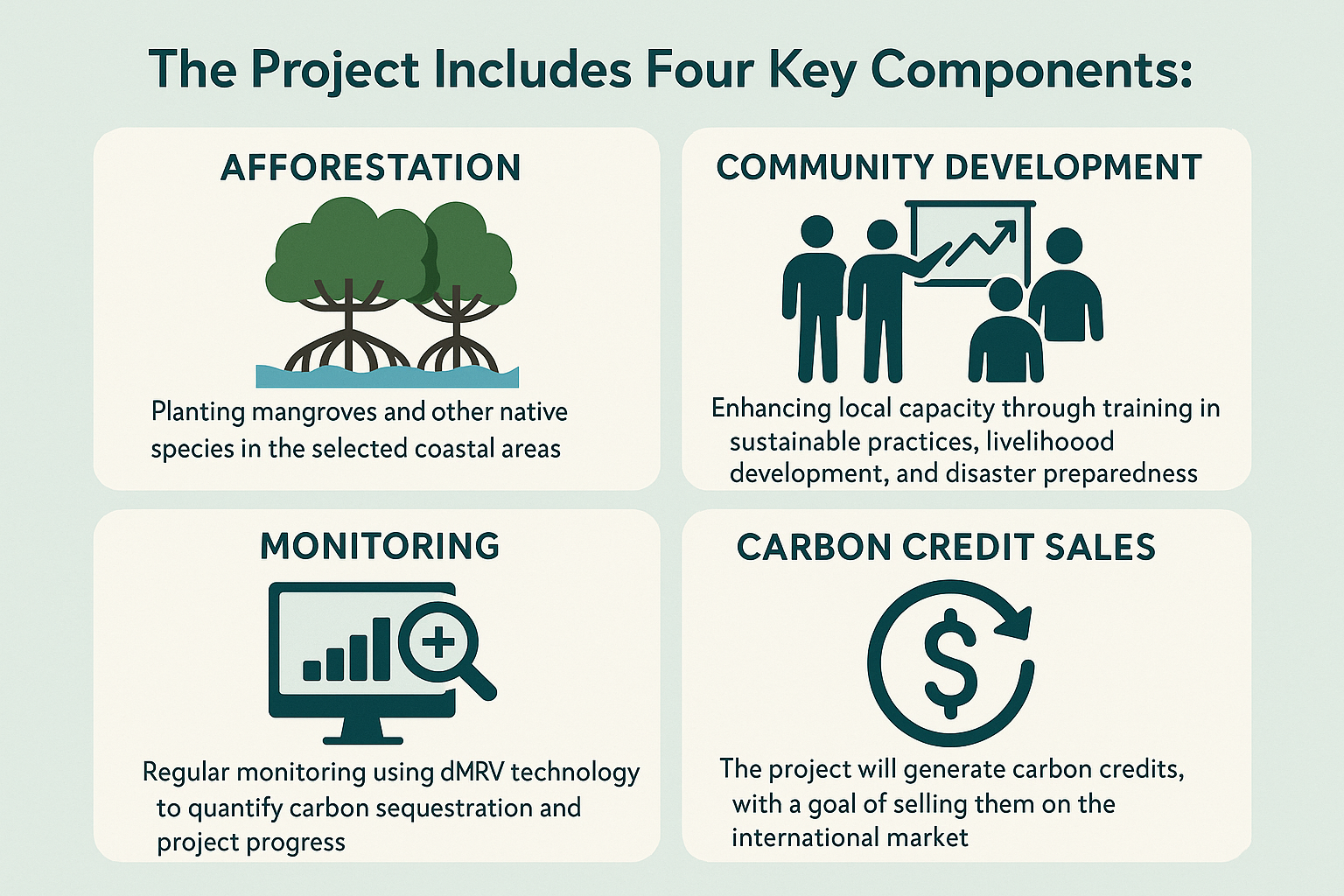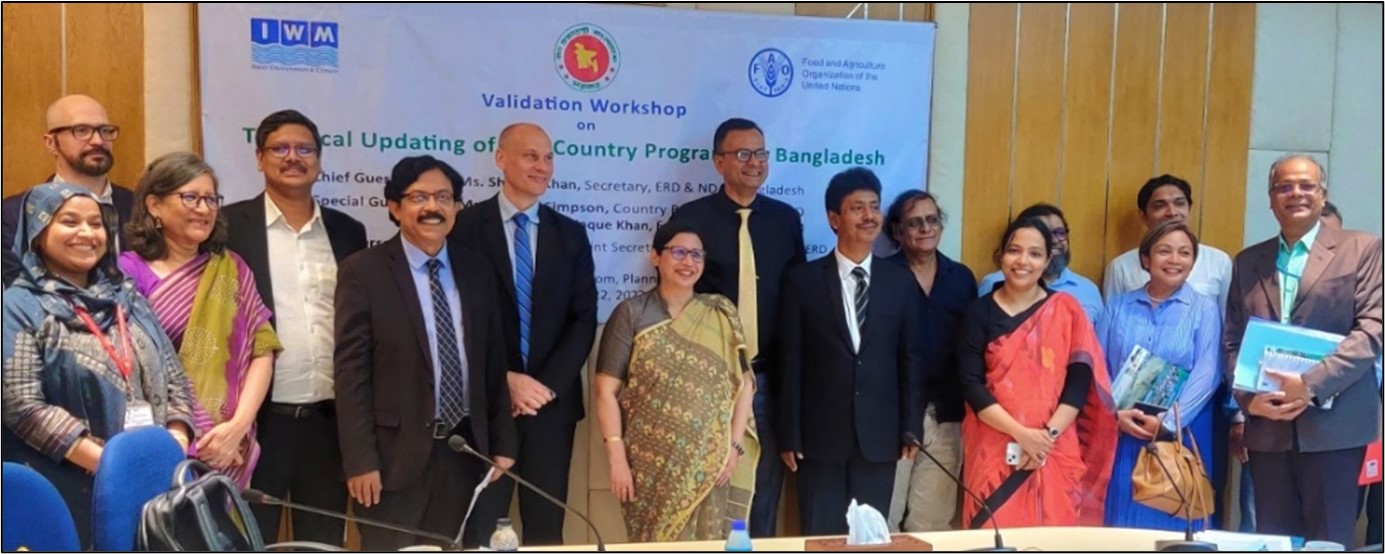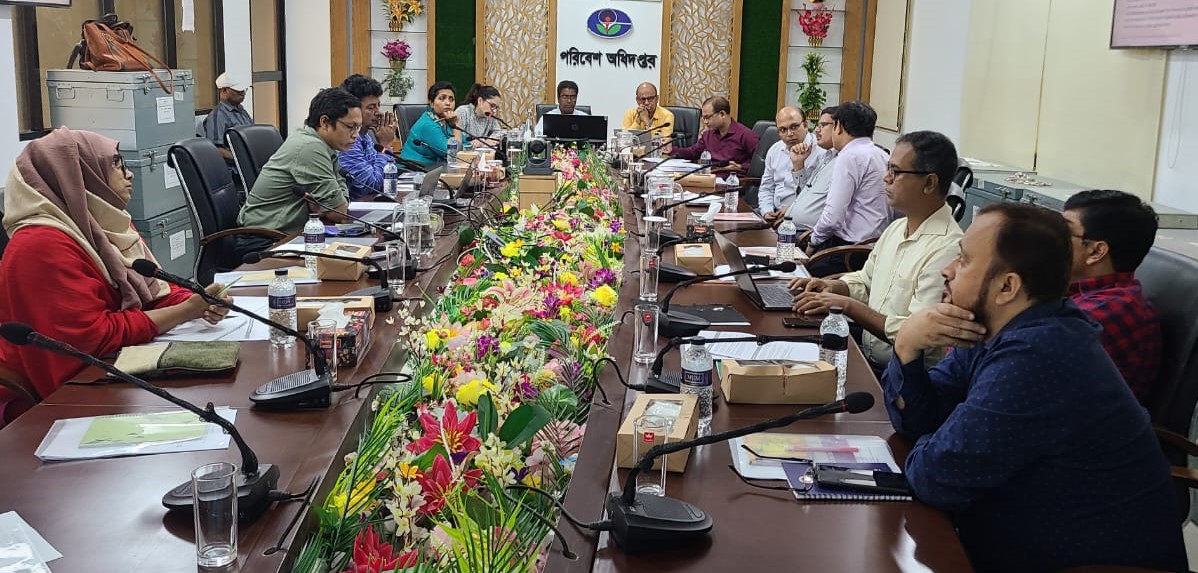
Strategic Planning & Business Development Unit (SPB)
Building Global Partnerships and Strategic Pathways for Sustainable Water, Environment & Climate-Resilient Development.

Building Global Partnerships and Strategic Pathways for Sustainable Water, Environment & Climate-Resilient Development.
Our Milestone Projects
Strategic Environmental Assessment (SEA) for the Project for the Formulation of Moheshkhali- Matarbari Integrated Infrastructure Development Initiative (MIDI) Master Plan in Bangladesh
The Moheshkhali Matarbari Integrated Infrastructure Development Initiative (MIDI) is an ambitious project aimed at transforming the economic landscape of the coastal region of Bangladesh. The project is crucial to supporting Bangladesh's Vision 2041, which aims to elevate the country to a high-income status by 2041 through sustained economic growth. The development of the MIDI region aligns with the Bay of Bengal Industrial Growth Belt (BIG-B) initiative, targeting strategic infrastructure in Matarbari and Moheshkhali Islands, including ports, power plants, roads, and industrial zones. By developing this region, Bangladesh aims to enhance its industrial capacity, foster sustainable development, and position itself as a competitive hub in the region.
The strategic environmental assessment (SEA) for the MIDI Master Plan is a key element of this project, focusing on the environmental and social implications of large-scale infrastructure development. The study will address crucial concerns, such as land use, environmental pollution, socio-economic impacts, and the preservation of biodiversity, ensuring that the project aligns with Bangladesh's environmental and social objectives. This assessment will guide decision-making and provide recommendations for mitigating adverse impacts.
Expected Outputs:
In collaboration with Nippon Koei Bangladesh, the International Consultants from JICA, and local sub-consultants, the study will be conducted from July 2025 to December 2027, ultimately contributing to the creation of a sustainable, economically viable, and environmentally responsible MIDI Master Plan.
The ‘Global Shield’ initiative, launched under the leadership of G7 and V20 countries at COP27, aims to strengthen financial protection for climate-vulnerable nations through pre-arranged, index-based Climate and Disaster Risk Financing and Insurance (CDRFI) mechanisms. In the context of Bangladesh, the initiative seeks to establish a robust national framework that ensures rapid financial response and recovery support in the aftermath of natural disasters.
Since 5 October 2024, the Economic Relations Division (ERD) under the Ministry of Finance has formally led the in-country process (ICP), with IWM providing technical assistance and strategic guidance to the Global Shield Secretariat. IWM is playing a pivotal role in conducting a comprehensive review of existing national financial protection and risk assessment mechanisms, including stock take and gap analysis, to identify structural and operational deficiencies. This assessment will inform the preparation of a National Support Demand Note, highlighting Bangladesh’s financial and technical requirements under the Global Shield framework.
To ensure coordinated stakeholder engagement and evidence-based recommendations, IWM has facilitated multiple bilateral consultations, advisory workshops, and focus group discussions (FGDs). These initiatives identify gaps in financial protection and risk management systems, provide actionable guidance for enhancing national resilience, and ensure the effective operationalization of the Global Shield initiative. Through these efforts, IWM is advancing climate resilience, sustainable risk financing, disaster preparedness, and strategic capacity building, positioning Bangladesh as a proactive leader in climate and disaster risk governance.
The establishment of a robust regulatory mechanism/framework in the water supply and sanitation services in Bangladesh is crucial to ensure the efficient, equitable, and sustainable management of these services. In collaboration with the Local Government Division (LGD), the Asian Development Bank (ADB) undertook an initiative to assist LGD in establishing regulatory mechanisms for water supply and sanitation in Bangladesh. As part of this effort, IWM and ITN-BUET were selected for the assignment in November 2023 to support LGD in developing this mechanism. IWM and ITN-BUET will assist LGD in developing institutional structures, formulating preliminary policies, standards, and guidelines, establishing key performance indicators for regulation and capacity development, and creating a roadmap for establishing a regulatory mechanism for water supply and sanitation.
The primary goal of the project is to establish a regulatory mechanism for water supply and sanitation aiming at strengthening the government's policies and regulations in the sector.
Establish a regulatory mechanism for water supply and sanitation in Bangladesh to ensure improved operational efficiency and financial sustainability of service providers.
Strengthening the capacity of service providers, including LGD, water utilities, local governments and private operators, to effectively understand and implement regulatory functions.

Carbon Credit Project: FARM 2 CARBON - Empowering Farmers through Horticultural Plantations and Climate Action
Location: The project will be implemented in the Chittagong Division of Bangladesh, specifically in Noakhali, Cumilla, Chittagong, Bandarban, Rangamati, Khagrachaori, and Cox’s Bazar districts.
Area: The targeted area for agroforestry is approximately 20,000 to 35,000 hectares.
Project Features:
Target Species: Mango, Guava, Papaya, Coconut, Dragon Fruit, timber species (teak, mahogany), nitrogen-fixing trees, and multipurpose trees like neem and moringa.
Expected Outcomes of the FARM2CARBON Project
The FARM2CARBON project aims to create a lasting impact on the environment, communities, and Bangladesh’s economy through sustainable development aligned with global climate goals.
Carbon Credit Project: Bengal Blue Carbon Initiatives
(Mangrove Afforestation for Protecting Coastal areas and Sequestration of GHG)
Location: The project will cover approximate 30,000 hectares of coastal land, specifically the Char areas of the Bay of Bengal.
Project Features:
Expected Outcomes:
This project will run from 2025 to 2044, contributing to both climate change mitigation and adaptation goals.

Bangladesh is one of the most vulnerable countries to climate change impacts. Bangladesh ranked seventh in the Global Climate Risk Index in 2021. The government of Bangladesh currently spends one billion dollars annually towards climate change mitigation and adaptation actions, which is 6-8% of the national annual budget. Bangladesh needs to mobilize and attract an enormous amount of climate finance.
In this regard, IWM was hired by the Food and Agriculture Organization (FAO) to support the Economic Relations Division (ERD), Planning Commission for the Green and Climate Resilient Development Program.
Major activities carried out by IWM:
Assessment of the current Bangladesh Country Program and review of the relevant documents, reports, and policy guidelines for Strengthening Bangladesh’s (National Designated Authority) NDA Secretariat, Enhancing Pipeline Implementation and Private Sector Engagement in Effective Climate Action;
Arranging inception workshops, sectoral workshops, and validation workshops at the national level. Meeting with 11 relevant ministries, 23 stakeholder agencies, representatives from the private sector, NGOs, multilateral development banks, bilateral financing entities, research organizations, professional associations, and community representatives to obtain their feedback and recommendations on climate financing and programmes/projects for GCF. Multi-criteria analysis was carried out to prioritize green and climate-resilient development projects for GCF funding. During this process, 59 projects were identified with a total estimated investment of around US$16 billion.

The World Bank hired IWM for the Department of Environment (DoE), Ministry of Environment, Forest and Climate Change. The primary objective of the assignment is to prepare and finalize an operational manual and management guidelines for the Environment Endowment Fund, to be established under the BEST Project. IWM deployed three key consultants to review relevant legislation, design the operational manual, and prepare an investment policy ensuring effective management, monitoring, and evaluation of fund assets. The team also proposed mechanisms for accounts management, auditing, and transparent utilization of returns to support research and innovation projects. This assignment enabled DoE to establish a structured, accountable, and sustainable framework for environmental financing in Bangladesh.

The Institute of Water Modelling (IWM), in collaboration with the Indian Institute of Technology, Bombay (IITB), successfully implemented a two-year transboundary research initiative titled “Groundwater Rejuvenation as Climate Change Resilience for Marginalized and Gender-sensitive Ganges (GRACERS).” The project was supported by DUPC and UN-IHE (Netherlands) and involved several renowned partners, including the National Institute of Hydrology (NIH), Government of India; IHE Delft, Netherlands; N.M. Sadguru Foundation, India; and ACWADAM, India, with IITB serving as the lead institution.
The study focused on the Ganges Delta regions of India and Bangladesh and examined the potential of distributed/decentralized groundwater recharge systems. The goal was to explore how monsoon rainfall could be harnessed and stored for use during dry seasons, thereby addressing water scarcity challenges in climate-vulnerable communities.
IWM major activities in the project:
The GRACERS project represents a landmark step in promoting climate-resilient, equitable, and sustainable water management across the Ganges Basin. Its findings offer critical inputs for policy development, regional cooperation, and practical interventions that support marginalized and gender-sensitive communities.
Delta Appraisal Framework Development: Accelerating the Bangladesh Delta Plan 2100 with IWM’s Expertise
The Bangladesh Delta Plan 2100 (BDP2100), adopted in 2018, envisions a safe, climate-resilient, and prosperous delta that secures water, food, economic growth, and environmental sustainability. It aligns the nation’s short- and medium-term development aspirations—such as achieving upper middle-income status by 2030 and becoming a developed country by 2041—with the long-term challenges of climate change and socio-economic shifts.
IWM is playing a pivotal role in fast-tracking this vision by introducing the Delta Appraisal Framework (DAF), a robust system built on the principles of Adaptive Delta Management (ADM). The DAF bridges critical gaps in public project preparation and appraisal, ensuring that all BDP2100-related initiatives are assessed for resilience, flexibility, and long-term adaptability. Supported by the World Bank’s Green and Climate Resilient Development Policy Credit, IWM has also contributed to drafting the Delta Act and technical annexes of the Bangladesh Water Rules (2018).
Using Multi-Criteria Analysis (MCA), the DAF prioritizes projects for inclusion in the Annual Development Programme (ADP), Revised ADP, and Investment Programs. Evaluation criteria include alignment with BDP2100 strategies, climate risk and vulnerability, cross-sectoral integration, cost–benefit balance, and adaptability under future uncertainties.
Beyond frameworks, IWM actively strengthens institutional capacity through policy support, stakeholder workshops, and training programs. These efforts not only ensure the sound implementation of ADM principles but also shape a resilient development pathway that will help Bangladesh withstand climate shocks and achieve its long-term national vision.
IWM played a key role in the Capacity Building for Delta Planning and Management (DeltaCap) project, commissioned by the Netherlands Initiative for Capacity Development in Higher Education (NICHE). With a team of senior specialists, urban planners and HRD experts, IWM contributed to strengthening the institutional and professional capacity required for implementing the Bangladesh Delta Plan 2100. The activities focused on building skills for adaptive delta management, promoting iterative learning and flexible programming and bridging the gap between academic knowledge and practical applications. Through training, knowledge transfer, and stakeholder engagement at both local and national levels, IWM helped establish a sustainable framework for water governance and long-term delta management in Bangladesh.
Our Core Team
Email: mdn@iwmbd.org
Mobile: 01841-930081
Email: sak@iwmbd.org
Mobile: 01841930046, 01720029790
Email: kmk@iwmbd.org
Mobile: 01849116251
Email: ahj@iwmbd.org
Mobile: 01711271377
Email: mis@iwmbd.org
Mobile: 01557735795, 01841930047
Email: smr@iwmbd.org
Mobile: 01819-238547
Email: mkw@iwmbd.org
Mobile: 01772643441